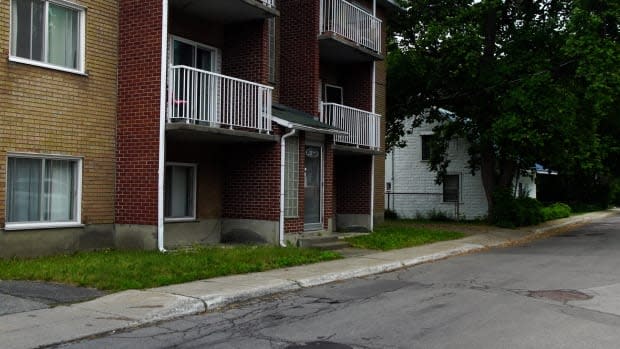Migrant workers lose their jobs after complaining about monthly rent totalling over $2,500

Quebec's workplace health and safety board has ordered a food-processing company north of Montreal to reimburse two temporary foreign workers for charging them excess rent.
The board told the company in July it had to pay the workers $3,800 each in housing costs it had deducted from their paycheques since May 2021.
The workers say that last spring, the company asked them to sign a contract raising their rent from $225 to $300 per pay period.
A number of the 48 temporary foreign workers from Madagascar employed by the plant at the time initially refused to sign — and asked the company if it could explain the increase.
Two workers filed complaints to the Commission des normes de l'équité de la santé et de la sécurité du travail (CNESST), Quebec's workplace health and safety board, after they said the company wouldn't budge.
The company only ended up taking $300 once from the paycheque of those who never signed the contract, but the workers say they were repeatedly asked to sign.
A month and a half later, those two employees and three others who had raised questions about the rent were fired.
"We are having a hard time with this situation at the moment," one of the former employees said during an interview in July. "We live in fear; we live in anguish; we live in uncertainty."
CBC spoke with all five employees who were fired, and has agreed not to name them because they fear reprisals for speaking up, and worry doing so could jeopardize their immigration status.

Employer alleges defamation
Many of the workers live in three-bedroom units with three or four other people and have to share a bedroom. CBC visited the building and saw one of the units. It was clean and well lit, but small for five people by North American standards and the workers said needed repairs had gone untouched.

The federal government requires an employer hiring foreign workers for low-wage positions to prove it will not deduct more than 30 per cent of those wages if they are providing housing.
Quebec labour regulations cap the amount employers can charge for rent at $53.47 per week — about half of what was being taken from the employees' paycheques.
Christophe Beauvais, the president of the company, Plaisirs Gastronomiques — which makes and distributes prepared foods to the province's major grocery chains — said his understanding is that regulation does not apply in the case of his employees, because he was not required to provide accommodation.
But in an email to CBC, a CNESST spokesperson said the regulation regarding housing costs, Article 6, is valid in cases "when the employer ensures that accommodation is provided to the worker without having the obligation to do so."
The labour board said it cannot comment on specific investigations, even after a decision is made.

The federal government told CBC in an email last week that "employers participating in the TFW Program must abide by both program requirements as well as applicable [provincial and territorial] laws in their region."
For decades, advocates have said overlapping jurisdictions in the temporary foreign worker programs can contribute to the difficulties workers face in having their rights respected.
In June, after the labour board complaints were filed in April, the employees were handed termination letters alleging they had defamed their employer, with the goal of obtaining an open work permit by claiming the company had mistreated them.
The company said it had screenshots of messages to back up its claim but did not provide them with the workers, nor CBC, citing privacy reasons.
Beauvais said workers were told the electricity, internet, furniture and appliance costs were higher than it had anticipated, and that the company had incurred a loss of more than $17,000. He said the total amounts to 17 per cent of the workers' income.
He said the company will be fighting the CNESST's claim in court.
"We played our role as good corporate citizens to fully facilitate their integration into the country," Beauvais told CBC News over the phone.
The owner of the apartment building, Pier-Olivier Gratton, told CBC News Plaisirs Gastronomiques rented the units five months before workers arrived in Canada to reserve the space.
Quebec relying on TFW program amid shortages
The five workers, who are in their early 30s and hold graduate degrees, said the appeal of working low-wage jobs far from home was a pilot project Quebec had just created allowing French-speaking temporary foreign workers in food processing to apply for permanent residency in the province after two years.
"We came here to integrate into Quebec society, to be able to live like other Quebecers and in the hopes of integrating our family into this society and to pursue our dreams — to live in harmony here in Canada," said another worker, who said the firing had caused him and his family back home a great deal of distress.
"I can't sleep, I have insomnia. Sometimes, I can't eat because my stomach turns me upside down every time I think about this."
Each of the workers send part of their earnings to Madagascar to help support their families.
The pilot project is one of several designed to encourage foreigners to work in Quebec in light of a serious labour shortage.
The program allows employers in Canada to hire foreign nationals to work in positions for which they struggle to hire locally. The foreigners are issued work permits tied to their employer, though the model has once again come under scrutiny with a rise in abuses reported during the pandemic.
"People like them filing complaints is the tip of the iceberg. Many refuse because they are afraid, and with good reason," said Michel Pilon, a former labour lawyer and co-founder of the Réseau d'aide aux travailleuses et travailleurs migrants agricoles du Québec (RATTMAQ), which filed the complaints on behalf of the employees.
Beauvais, the company president, said the firings had nothing to do with the labour board complaints, because the identities of the complainants are confidential.
He said they were over comments the workers had made putting Plaisirs Gastronomiques's reputation in danger. He said the company is now reconsidering recruiting abroad.

Eugénie Depatie-Pelletier, who has published several studies on migrant work and is the executive director of the Montreal-based Association for the Rights of Household and Farm Workers, said the reference to open work permits in the termination letter shows the employees knew they were at risk of being fired for advocating for themselves.
"The moment they raise their hand up and file a complaint, there is more than a risk of them being fired, it's almost 100 per cent," Depatie-Pelletier said.
She said she has heard of other cases of employers accusing temporary foreign workers of defamation, and even of stealing goods, as ways of justifying terminations.
The federal government made it possible for temporary foreign workers who can show they are at risk of being abused to apply for open work permits in 2019. The permits expire after a year and are non-renewable.
Pilon said the RATTMAQ is also filing complaints to the CNESST for all five workers for unfair dismissal.
Beauvais said he doesn't see a power imbalance in the employer-tied permits because of how costly it is to hire temporary foreign workers.
He said he intended to transfer the apartment leases directly to the workers. At least one worker told CBC that was done recently and that the rent is now a total of about $1,200 per month, plus utilities.


